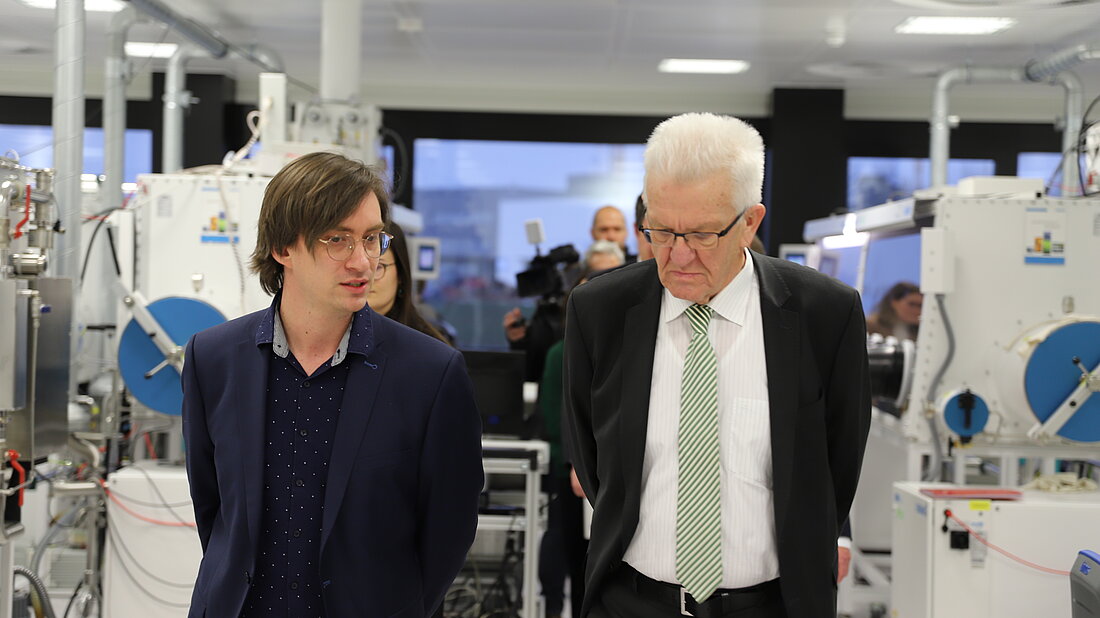
Prime Minister Kretschmann visits Ulm battery research site

Research location Ulm covers all steps of battery development
Prime Minister Winfried Kretschmann visits the Cluster of Excellence POLiS, the research platform CELEST and the Center for Solar Energy and Hydrogen Research Baden-Württemberg
Prime Minister Winfried Kretschmann visited the Cluster of Excellence POLiS (Post Lithium Storage), CELEST and the Center for Solar Energy and Hydrogen Research Baden-Württemberg (ZSW) at the Ulm research site on February 3, 2023 to learn about battery research. During a laboratory tour at the Cluster of Excellence, he gained a personal overview of a fully digitized and automated laboratory for accelerated material development that is unique in the world. At the ZSW, the focus was on facilities for research into the near-series production of large lithium-ion cells.
"The POLiS Cluster of Excellence, the CELEST research platform and the Center for Solar Energy and Hydrogen Research Baden-Württemberg (ZSW) are hubs of battery and hydrogen research. Here, battery technology is being taken to a whole new level. With the development of new battery materials that no longer rely on critical materials, Ulm is making an extremely important contribution to making our economy more independent - after all, the geopolitical changes have shown us the effects that dependencies can have," said Prime Minister Kretschmann. "As the state government, this is also why we initiated the Battery Round Table, to bring together research and companies in this area. And to identify and accompany challenges and developments in battery technology at an early stage."
"At the Ulm University, basic electrochemical research dates back to the 1980s. Today, more than 400 employees at various institutions are involved in the entire battery research development chain, making Ulm one of the battery competence centers in Europe," said Prof. Michael Weber, president of Ulm University.
"At KIT, we pursue a transdisciplinary approach in battery research that encompasses the entire value chain. From materials research to production technology and cell development to complete energy storage systems, we are working on innovative solutions," says Prof. Holger Hanselka, President of KIT. "In doing so, we work in a practical manner and cooperate closely with industry and our renowned partner institutions in Ulm and around the world to contribute to the energy transition."
"Based on the long-standing expertise of the University of Ulm and the Karlsruhe Institute of Technology (KIT), the Helmholtz Institute Ulm, POLiS and the CELEST research platform have been created together with the ZSW. The CELEST initiative makes us one of the largest players in battery research worldwide," said Prof. Dr. Maximilian Fichtner, director of CELEST and spokesperson for the POLiS excellence cluster.
"Battery materials, battery cells and complete battery systems - especially for electromobility - are developing at a rapid pace. At the Ulm Science Park, all players are ideally positioned to implement development trends in batteries," says. Prof. Dr. Markus Hölzle, ZSW board member and head of the Electrochemical Energy Technologies business unit. The focus at ZSW in Ulm is on technology transfer from laboratory scale to series production."
Batteries based on sodium, magnesium and calcium
The POLiS cluster of excellence is researching more sustainable battery materials and technology concepts based on sodium, magnesium and calcium that do not require lithium and other critical raw materials. The first automated platform for accelerated battery material development represents an important building block for research into lithium alternatives. "Our facility is capable of building batteries around the clock, analyzing thousands of interfaces, evaluating them using artificial intelligence (AI) methods, and planning new experiments. In addition to acceleration through automation, the algorithms and AI can achieve additional optimization, which is 10 times faster, and bring promising battery materials to market faster and at lower cost," said tenure-track Prof. Helge Stein (KIT), research area spokesperson at POLiS. The research facility is also embedded in a European framework. Data collected by the facility from all areas of the battery development cycle are shared with 34 institutions from 15 countries in the BIG-MAP project of the European research initiative BATTERY2030+, in which CELEST also plays an important role.
Industrial production research from the material to the cell
More than 100 scientists at ZSW have been working on lithium-ion and post-lithium batteries for many years. Here, the institute takes a holistic approach: Beginning with the production and characterization of active materials to the construction of complete battery systems and their testing, the work ends with the topic of battery recycling. Minister President Winfried Kretschmann visited the pilot plant for the industrial production of large lithium ion cells, which has been in operation since 2013 and will be expanded in 2022 and is unique in Europe, as they are used in electric vehicles today. Another stop on the tour was the construction site for the new "Powder-Up" pilot plant. Over the next twelve months, the ZSW will construct a new building for a pilot plant to produce cathode materials for lithium-ion batteries in material batches of 100 kilograms. Such quantities are required to be able to produce large battery cells for electric cars or stationary storage units in the first place. The facilities cover the entire production chain, but also enable research work on individual manufacturing steps. The battery materials produced can then be used in pilot plants at research institutes or by battery producers. The state of Baden-Württemberg is supporting this new building with 10 million euros.
